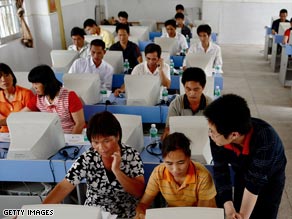(CNN) -- In early January China released a list of major online portals and Web sites that it claims provide and spread pornographic or obscene content, state media reported.

Farmers in China learn how to use the Internet in April 2008 in Guangdong province.
Rebecca MacKinnon, co-founder of Global Voices, an assistant professor of journalism at Hong Kong University, a former CNN correspondent and an observer of China and the Internet, recently discussed with CNN the move by Beijing.
CNN: Is this affecting Web sites in Hong Kong?
MacKinnon: Not to my knowledge. Of course, in Hong Kong there is a review on obscene articles ordinances and debate on how such content should be censored. There are some Web sites in mainland China that have Hong Kong investments that would be affected, but this is a one-country, two-systems policy. Hong Kong and China have separate legal jurisdictions.
CNN: Are these recent actions connected to filtering?
MacKinnon: This crackdown isn't related to filtering; there are two types of censorship already in place. One kind of censorship is blocking overseas Web sites. However, the crackdown on Monday, performed by six different government departments relates to a different type of censorship. This is aiming for Web sites that operate inside of China and the content is completely removed from the Internet." .
CNN: How effective will China's actions be?
MacKinnon: The crackdown listed 19 different Web sites. The government basically said there was too much inappropriate material, or "low and vulgar" content, and sites need to clean up their act.
Three Chinese Web sites apologized and created a hot line to report it. On Tuesday, three editors at Netease, based in South China, were dismissed as a result of content which appeared. Chinese Web site companies are definitely jumping to clean it.
oogle China apologized publicly on their Chinese blog about what they're doing in China and explained they're removing the inappropriate content. They even set up a hot line and support e-mail to allow users to report any inappropriate content. Netease, Baidu and Sina had also done the same thing and have all apologized. Companies are doing their best to comply.
However, people could argue that the technology they use to censor sexual content can also be used clean up political censorship however there is no direct evidence to show it.
CNN: How effective have other countries been with similar actions?
MacKinnon: A lot of countries are filtering Internet pornography on the Internet. Take a look at the Open Net Initiative (opennet.net), they show systematic studies on Internet filtering around the world. There are several dozen countries that filter the Internet on a national basis.
Australia is testing a nationwide filtering system. The United Kingdom temporarily blocked Wikipedia because it contained an image on an album cover of a child that appeared offensive.
However, the idea of censoring inappropriate content ties with debates on who has the power to decide what is appropriate and what is not. Internet censorship is happening all over the world and it's growing.
CNN: What do you think prompted this action by China?
MacKinnon: There are crackdowns from time to time. Generally, before Chinese New Year, there is some sort of anti-porn crackdown that takes place. It's a seasonal thing, not many people are entirely shocked. There was a crackdown on an online video site last March, which resulted in a 24-hour shutdown. Companies in China have expectations of these sorts of things and prepare to deal with it.
CNN: Is more content getting through China's filtering systems?
MacKinnon: Most Chinese users do not use proxies. However it is difficult to do a full-fledged survey to find out, since it is a very sensitive topic. Although you cannot get definitive numbers, analysts look at Chinese Internet behavior by observing Internet users and it appears that only small percentage uses proxies to circumvent certain blacklisted Web sites.  Learn more on how China filters the Internet »
Learn more on how China filters the Internet »
And those users are usually foreigners trying to access their favorite blogs. However, there is so much interesting content that is not blocked and most people find it too much of a hassle to use proxies.
(original article)











